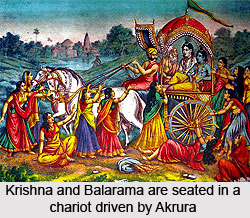 Akrura was born in the descent of Yadavas and was the uncle of Lord Krishna. He was the son of Swaphalka and Gandini. He took charge of the celebrated Syamantaka jewel from Satadhanwan when he was asked by Krishna. Due to this gem, there was no dearth or epidemic in the whole country. As pursued by Krishna, Akrura started wearing the jewel publicly round his neck, where it shone with dazzling brightness.
Akrura was born in the descent of Yadavas and was the uncle of Lord Krishna. He was the son of Swaphalka and Gandini. He took charge of the celebrated Syamantaka jewel from Satadhanwan when he was asked by Krishna. Due to this gem, there was no dearth or epidemic in the whole country. As pursued by Krishna, Akrura started wearing the jewel publicly round his neck, where it shone with dazzling brightness.
Akrura became a famous devotee by his worship. Akrura was free from all kinds of fears and grief. Akrura was one of the courtiers of `Kansa`. He continued to serve Kansa even when all other courtiers of Kansa left him due to his torture. Akrura was sent as a messenger to invite Krishna, Balarama and the other cowherds in the Dhanush Yagya arranged by Kansa. He planned to kill him by the demons in this occasion. Akrura was thrilled at this, as he himself was desirous of seeing Krishna.
Akrura was very excited that he woke up in the early morning and left for Mathura to meet Krishna. He kept thinking of Krishna all his way. Akrura reached Vrindabana in this thought and saw the footmarks of Krishna there. He jumped down from his chariot and saluted that sacred soil. His heart was filled up with deep satisfaction. When he reached Vraja, Krishna embraced him and took him to his house. Akrura was given a good care and offered honour. Then he informed his purpose of coming and took Krishna and Balaam along with him. After reaching Mathura, Akrura asked him to go with him but Krishna told that after being a guest of his maternal uncle Kansa, he would certainly come to his place. Keeping his promise, Krishna visited Akruara`s house after killing Kansa. Akrura went to Hastinapura to take the news of the Pandavas at the request of Krishna. Although he was Krishna`s uncle, Akrura was a great devotee of Krishna. At the end, he too went to the `Paramdhaam` along with Krishna.












